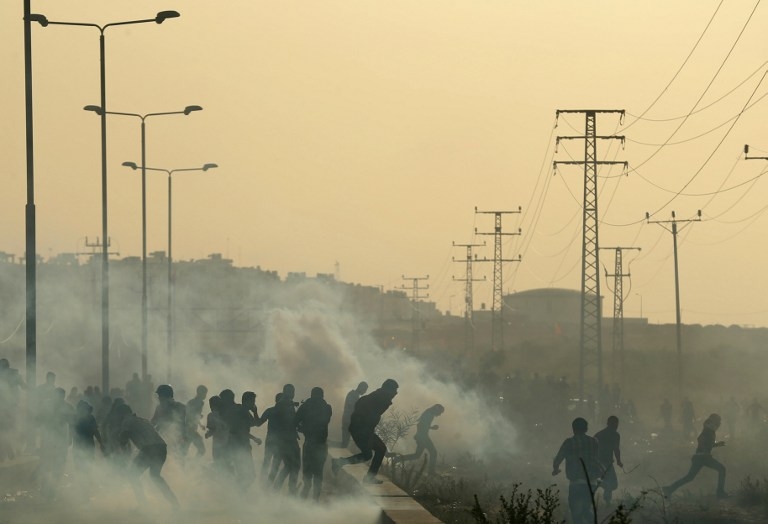Kerry, Abbas meet as Palestinian-Israeli unrest continues

US Secretary of State John Kerry met with Palestinian president Mahmoud Abbas on Saturday as part of an international diplomatic push to quell a wave of deadly Israeli-Palestinian violence.
The talks came as a Palestinian teenager allegedly attempted to stab an Israeli security guard at a checkpoint in the West Bank town of Jenin and was shot dead, according to Israeli police.
Eyewitnesses, however, told Ma'an News Agency that the teenager, who has not been identified, was not trying to stab anyone when Israeli forces opened fire. They also said that soldiers prevented Palestinian Red Crescent ambulances from reaching the boy, who they said was 16.
Kerry, who held talks with Israeli Prime Minister Benjamin Netanyahu in Berlin on Thursday, met Abbas in Amman, where he was also due to meet Jordan's King Abdullah II, custodian of Jerusalem's Al-Aqsa mosque compound which has been a focal point of the unrest.
They both expressed guarded optimism going into the talks, which come a day after more than 80 people were wounded in clashes between Palestinians and Israeli troops in the occupied West Bank and Gaza Strip.
"I'm hopeful. Let us have our meeting," Kerry told reporters.
Abbas for his part said: "All the time we have the hope. We did not lose the hope."
The international community is seeking a halt to a wave of violence that began three weeks ago.
Kerry, his Russian counterpart Sergei Lavrov, EU foreign policy chief Federica Mogherini and UN Secretary General Ban Ki-moon - members of the Middle East peacemaking Quartet - appealed for "maximum restraint" after talks on Friday in Vienna.
They also issued a call for Israel to work with Jordan, historic steward of the Al-Aqsa compound.
The latest wave of violence erupted over the status of the flashpoint holy site, which is sacred to both Jews and Muslims and has long been a crucible for tensions fuelling the decades-old Israeli-Palestinian conflict.
Tensions over the mosque compound have triggered a wave of knife attacks, shootings and car-rammings against Israelis, as well as clashes between Palestinians and Israeli security forces and attacks by Jewish settlers on Palestinians.
Since the start of this month, 51 Palestinians and one Palestinian citizen of Israel have died in clashes or while allegedly carrying out attacks.
Eight Israelis have been killed in attacks. One Israeli Jew and one Eritrean aslyum seeker have been killed after being mistaken for attackers.
Violence flared in the West Bank and the Gaza Strip on Friday when Palestinian movements held a protests against Israel.
Youths lobbed stones at Israeli police who responded with tear gas and gunfire at checkpoints in the occupied West Bank, where 20 Palestinians sustained gunshot wounds.
According to emergency services, 65 people, including three journalists, were hit by Israeli fire in the blockaded Gaza Strip.
The army said an Israeli woman and her two young daughters were wounded in the West Bank when her car was hit with a Molotov cocktail.
The violence came despite Israel lifting age limits for the main weekly prayers at Jerusalem's Al-Aqsa mosque compound Friday in an apparent bid to ease tensions.
Netanyahu has repeatedly accused Abbas of fanning the flames by suggesting Israel wants to change the status quo at the Al-Aqsa compound under which Jews are allowed to visit but not pray.
However, Palestinian leaders and activists said Israeli incursions at the compound ahead of the latest wave of violence, including shooting rubber bullets and tear gas at Palestinians in the mosque whom they said were planning an attack, were unprecedented.
Middle East Eye propose une couverture et une analyse indépendantes et incomparables du Moyen-Orient, de l’Afrique du Nord et d’autres régions du monde. Pour en savoir plus sur la reprise de ce contenu et les frais qui s’appliquent, veuillez remplir ce formulaire [en anglais]. Pour en savoir plus sur MEE, cliquez ici [en anglais].

